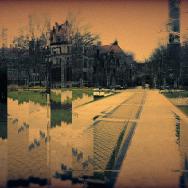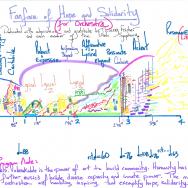Fifty years from now, what will historians find when they look back on the coronavirus pandemic that has changed the world—and more narrowly, the University of Chicago community—as we once knew it?
That’s what UChicago Library archivists are attempting to capture with the Special Collections Research Center’s request for photographs, stories, born-digital files and other ephemera to document the many different and unique experiences of our community during the time of COVID-19.
“Ten, 20 years down the road, people are going to want to see what was happening with our campuses, our students, our faculty—and just how everyone’s life got turned upside down,” said Assistant University Archivist Eileen Ielmini, who has been at UChicago since 1998.
“We have a very diverse campus and community on the South Side, and (COVID-19) is affecting everyone differently. Some people will be interested to share their experiences, and this will benefit folks down the line when researchers try to better understand both why and how certain things happened.”
But what does it look like to document the pandemic? To try and answer that question, Special Collections is soliciting ideas from students, staff, faculty, alumni and South Side community members. Donations could take the form of written or spoken word, photographs, objects, art and more, which detail how all aspects of life—including education, work, or relationships—have changed during this historic time.
One unique source of early donations came from a section of Power, Identity and Resistance in the Social Sciences Core, taught this spring by Teaching Fellow Trish Kahle.
Students had the option to complete the task either digitally or in paper notebooks, and many included news clippings, tweets, or Instagram posts to go along with their writings on everyday life during a pandemic. Kahle estimates around half of her 30 or so students will donate their journals to the Special Collections effort.
“They really ended up liking the journals and found them to be one of the most useful parts of the class,” Kahle said. “The journals ended up being a very important processing tool for them, which I think was really important and one of the main reasons we did the project.”
One of her class’s key learning outcomes also speaks to why Special Collections is committed to gathering stories and items from a variety of community members.
“Part of what we learned was about democratizing whose voices are heard and what happens when include a wider range of voices to understand American democracy as a contested idea,” Kahle said. “I thought this was a way to put that into practice—a future historian will want to know what your voice sounds like, and that’s how I presented it to them.”
Special Collections has also begun to archive University websites related to the coronavirus pandemic, in addition to featuring a student-led community website called Archive in Place, which also calls for digital submissions from the University community.
Unsure if your contribution would work for the project? Ielmini encourages anyone with questions to reach out directly, while also urging people to think outside the box.
“Telling your story can happen in a variety of ways,” she said. “Your story doesn’t have to be the narrative that you sit down and write, it could be that mask, a sign you see in a storefront, it could be as simple as an object or a piece of paper that is your negative test result.
“It could be anything—what hits home to you when you’re thinking about COVID-19? That’s what we’re looking for.”

